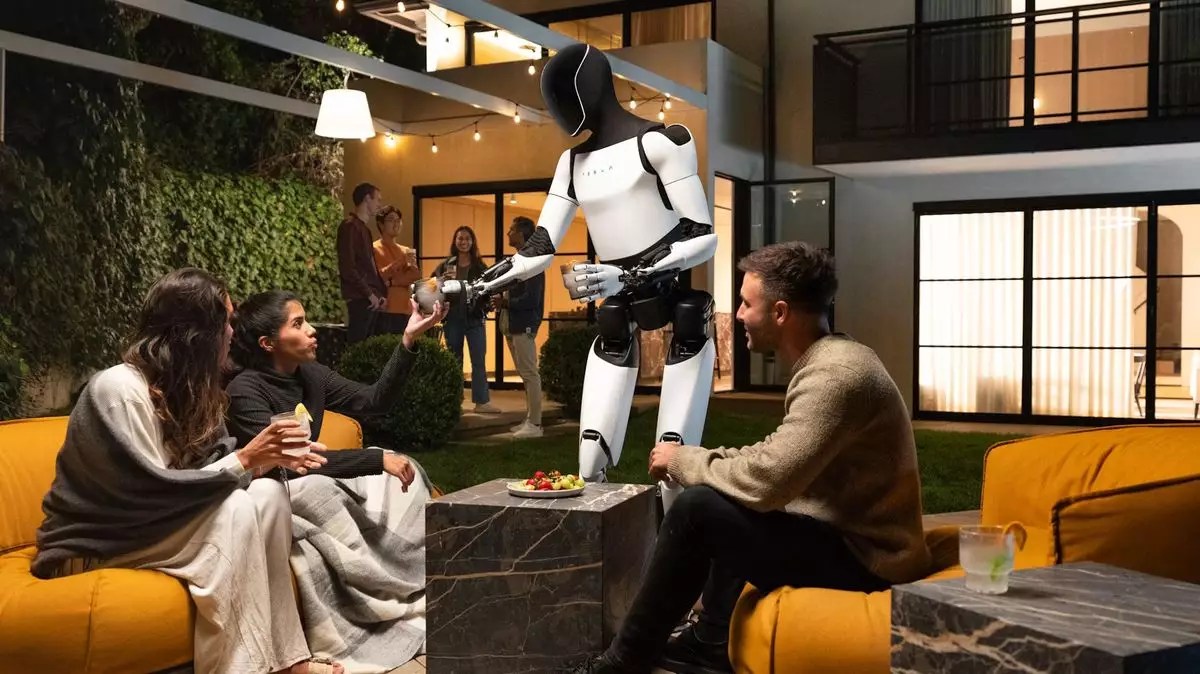In recent years, the notion of humanoid robots has captivated the public’s imagination, fueled in large part by technological advances and high-profile announcements. One of the most significantly hyped revelations came from Elon Musk in 2021, when he introduced a humanoid robot that turned out to be little more than a person dressed in a suit. Fast forward to 2022, and Tesla presented a prototype of this much-anticipated robot, Optimus, which impressed attendees by walking without falling over, albeit at a slow pace. The level of excitement generated by these events invites scrutiny into the reality behind the glitzy exterior of such technological unveilings.
At a recent event termed “We, Robot,” Musk showcased several Optimus robots, making grand claims about their capabilities. He suggested that these machines would perform an extensive array of tasks—from acting as companions to taking care of household chores. This spectacle seemed designed to emphasize the versatility and potential market impact of these robots. “They’ll be able to do anything you want,” exclaimed Musk, positioning the Optimus as the ultimate domestic assistant. While such ambitions are intriguing, they warrant a deeper exploration into the technical feasibility and ethical implications of fully autonomous humanoid robots.
The presentation included a demonstration where an Optimus robot served drinks at a bar following the event. However, reports indicated that the bartending robot was actually being controlled remotely by Tesla employees. This revelation sheds light on the stark contrast between the promising narrative presented by Musk and the grounded reality of how the robots currently operate. While the robots appeared to perform tasks seamlessly, the fact that they were not functioning independently raises legitimate concerns about their actual capabilities.
Musk’s failure to unequivocally state that the Optimus robots are powered by artificial intelligence or possess autonomous characteristics further exacerbates skepticism. If the technology was truly groundbreaking, it is reasonable to assume that Musk would have highlighted this feature. Instead, the omission gave rise to speculation regarding whether Tesla is deliberately withholding information about their robots’ functionalities to maintain a competitive edge or simply stirring curiosity due to the lack of substantive advancements.
The dream of autonomous robots capable of integrating seamlessly into daily life is far from new. Many people envision a future where these machines will alleviate burdens, yet the technical and ethical hurdles that remain are formidable. The field of robotics has made strides in recent years, but the reality of fully autonomous humanoid robots is still a distant prospect. Over the years, prominent claims by Musk regarding technology breakthroughs—such as self-driving cars or colonization of Mars—have often fallen short of expectations.
Pioneering developments, while exciting, underscore a broader trend of inflated ambitions associated with Elon Musk. The gap between aspirational statements and actual product delivery has, unfortunately, become a pattern. Although it’s essential to foster innovation, it is equally critical to temper expectations with realism to avoid breeding a culture of disillusionment among consumers and investors.
The rush to design robots that can take over household tasks brings with it ethical considerations that cannot be overlooked. Questions regarding job displacement, dependence on technology, and the emotional impacts of human-robot interactions loom large. While Musk’s vision of having an “Optimus buddy” become a household staple is enticing, it implicitly raises the question: should we, as a society, be ready to embrace robots as companions and caregivers?
Moreover, if Tesla aims to position these robots as integral members of our daily lives, it must also consider regulations governing their development and deployment. The societal implications of widespread use of humanoid robots echo through debates on privacy, security, and the moral responsibilities of AI.
As we look ahead, the excitement generated by the unveiling of robots like Optimus is tinged with realism. While it is essential to celebrate technological advancement, we must also hold developers accountable for transparency regarding their products’ capabilities. The future may hold doors to incredible opportunities for the integration of robots into daily life—but it is crucial that this journey is undertaken with caution, prudence, and ethical responsibility. Only then can we ensure that the promises of tomorrow do not become the disillusionments of today.


Leave a Reply